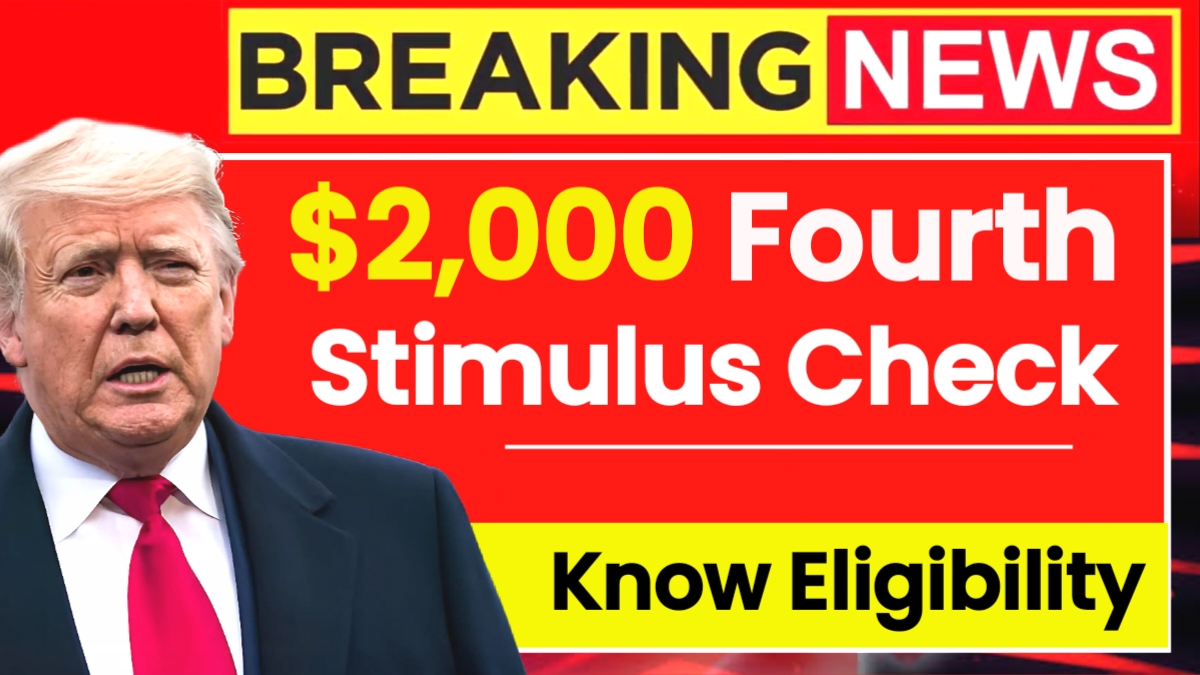The COVID-19 pandemic created unprecedented economic challenges for millions of Americans, prompting the U.S. government to provide financial relief through stimulus checks. Between 2020 and 2021, three rounds of payments were successfully distributed to eligible citizens, helping many weather the financial storm brought on by lockdowns, job losses, and health crises. These direct payments proved to be crucial lifelines for families struggling with essential expenses during uncertain times. Now, as inflation and rising living costs continue to burden many households, discussions about a potential fourth stimulus check of $2,000 have emerged across various platforms.
Current Status of the Fourth Stimulus Check
Despite widespread speculation about a fourth round of stimulus payments, it’s important to clarify that as of now, no official announcement has been made by the U.S. government or the Internal Revenue Service (IRS) regarding a $2,000 payment for 2025. The information circulating online remains speculative, with no confirmed plans for implementation. While many citizens continue to face financial hardships due to inflation and the long-term economic effects of the pandemic, the decision to issue additional stimulus payments ultimately depends on congressional approval and IRS administration, neither of which have formally committed to such a program.
Potential Eligibility Requirements
If a fourth stimulus check were to be approved, eligibility would likely follow patterns established by previous payments. Typically, recipients would need to be U.S. citizens or permanent residents with valid Social Security numbers who file regular tax returns. Income thresholds would probably remain similar to previous rounds, with full payments going to individuals earning less than $75,000 annually or married couples earning under $150,000. Adults aged 65 or older might receive special consideration, as would individuals with particularly low incomes who struggle to cover daily living expenses. However, these criteria remain hypothetical until an official program is announced.
Economic Impact and Purpose
The purpose of any potential fourth stimulus payment would be to alleviate ongoing financial stress for Americans still recovering from pandemic-related setbacks while facing new challenges from inflation. Such payments would help recipients cover essential expenses like housing, utilities, food, and healthcare. Economic experts suggest that stimulus payments also benefit the broader economy by increasing consumer spending, potentially supporting local businesses and contributing to economic growth. For many households, an additional $2,000 could provide meaningful relief during times of financial uncertainty and rising costs.
Protecting Yourself from Misinformation and Fraud
With rumors about stimulus checks spreading rapidly online, Americans should exercise caution and verify information through official government channels. The IRS official website (irs.gov) remains the most reliable source for updates on any potential stimulus programs. Unfortunately, periods of financial uncertainty often coincide with increased scam attempts. Citizens should be vigilant about protecting their personal and financial information, never sharing sensitive details with unverified sources claiming to facilitate stimulus payments. Legitimate government communications about stimulus programs will never request bank account information through email, phone calls, or text messages.
Alternatives to Stimulus Support
While waiting for concrete news about potential stimulus payments, Americans facing financial difficulties may benefit from exploring other assistance programs. These include enhanced child tax credits, expanded unemployment benefits in certain states, emergency rental assistance, and various state-level relief programs. Many local communities also offer resources through food banks, utility payment assistance, and other support services. Additionally, the federal government continues to operate various aid programs targeting specific needs, which may provide alternatives for those requiring immediate financial support.
Looking Forward
The conversation surrounding a potential fourth stimulus check reflects ongoing economic challenges facing many Americans despite overall economic recovery. Whether or not a $2,000 payment materializes in 2025, the discussion highlights the continued need for financial support systems during periods of economic transition and inflation. Citizens concerned about their financial situation should stay informed through official government channels, explore all available assistance options, and practice sound financial management while navigating these uncertain times. Should a fourth stimulus payment be approved, details will be widely communicated through official government websites and legitimate news sources.
The COVID-19 pandemic created unprecedented economic challenges for millions of Americans, prompting the U.S. government to provide financial relief through stimulus checks. Between 2020 and 2021, three rounds of payments were successfully distributed to eligible citizens, helping many weather the financial storm brought on by lockdowns, job losses, and health crises. These direct payments proved to be crucial lifelines for families struggling with essential expenses during uncertain times. Now, as inflation and rising living costs continue to burden many households, discussions about a potential fourth stimulus check of $2,000 have emerged across various platforms.
Current Status of the Fourth Stimulus Check
Despite widespread speculation about a fourth round of stimulus payments, it’s important to clarify that as of now, no official announcement has been made by the U.S. government or the Internal Revenue Service (IRS) regarding a $2,000 payment for 2025. The information circulating online remains speculative, with no confirmed plans for implementation. While many citizens continue to face financial hardships due to inflation and the long-term economic effects of the pandemic, the decision to issue additional stimulus payments ultimately depends on congressional approval and IRS administration, neither of which have formally committed to such a program.
Potential Eligibility Requirements
If a fourth stimulus check were to be approved, eligibility would likely follow patterns established by previous payments. Typically, recipients would need to be U.S. citizens or permanent residents with valid Social Security numbers who file regular tax returns. Income thresholds would probably remain similar to previous rounds, with full payments going to individuals earning less than $75,000 annually or married couples earning under $150,000. Adults aged 65 or older might receive special consideration, as would individuals with particularly low incomes who struggle to cover daily living expenses. However, these criteria remain hypothetical until an official program is announced.
Economic Impact and Purpose
The purpose of any potential fourth stimulus payment would be to alleviate ongoing financial stress for Americans still recovering from pandemic-related setbacks while facing new challenges from inflation. Such payments would help recipients cover essential expenses like housing, utilities, food, and healthcare. Economic experts suggest that stimulus payments also benefit the broader economy by increasing consumer spending, potentially supporting local businesses and contributing to economic growth. For many households, an additional $2,000 could provide meaningful relief during times of financial uncertainty and rising costs.
Protecting Yourself from Misinformation and Fraud
With rumors about stimulus checks spreading rapidly online, Americans should exercise caution and verify information through official government channels. The IRS official website (irs.gov) remains the most reliable source for updates on any potential stimulus programs. Unfortunately, periods of financial uncertainty often coincide with increased scam attempts. Citizens should be vigilant about protecting their personal and financial information, never sharing sensitive details with unverified sources claiming to facilitate stimulus payments. Legitimate government communications about stimulus programs will never request bank account information through email, phone calls, or text messages.
Alternatives to Stimulus Support
While waiting for concrete news about potential stimulus payments, Americans facing financial difficulties may benefit from exploring other assistance programs. These include enhanced child tax credits, expanded unemployment benefits in certain states, emergency rental assistance, and various state-level relief programs. Many local communities also offer resources through food banks, utility payment assistance, and other support services. Additionally, the federal government continues to operate various aid programs targeting specific needs, which may provide alternatives for those requiring immediate financial support.
Looking Forward
The conversation surrounding a potential fourth stimulus check reflects ongoing economic challenges facing many Americans despite overall economic recovery. Whether or not a $2,000 payment materializes in 2025, the discussion highlights the continued need for financial support systems during periods of economic transition and inflation. Citizens concerned about their financial situation should stay informed through official government channels, explore all available assistance options, and practice sound financial management while navigating these uncertain times. Should a fourth stimulus payment be approved, details will be widely communicated through official government websites and legitimate news sources.





